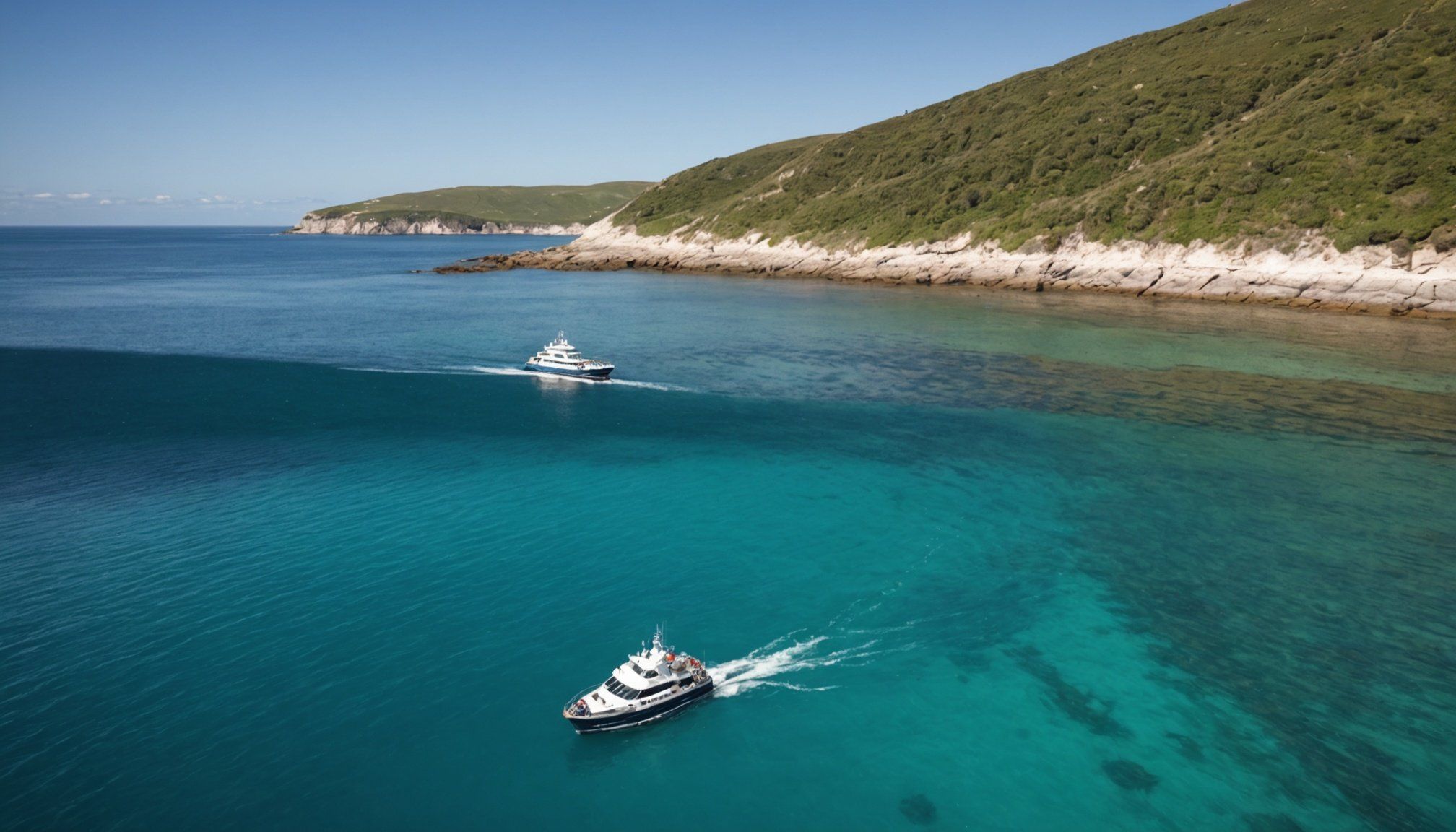Understanding Marine Conservation Consultancies
Marine conservation consultancies play a crucial role in safeguarding the health of our ocean ecosystems. They are specialized firms committed to providing expert guidance and solutions for marine conservation efforts. Their role involves advising stakeholders on best practices, conducting ecological assessments, and developing strategies for sustainable management of marine resources. This guidance ensures that actions taken are both effective and compliant with existing regulations.
The significance of marine conservation consultancies cannot be overstated, as they address challenges posed to marine ecosystems worldwide. They help mitigate issues like pollution, overfishing, and habitat degradation, aiming to restore and maintain biodiversity.
Also to read : Ultimate Blueprint for Starting a UK Healthcare SaaS Business: A Step-by-Step Launch Process
In the UK, there is a noticeable rise in demand for these services due to increased awareness about environmental protection and regulatory requirements. Organizations, both governmental and non-governmental, look towards consultancies for their vast knowledge and specialized services.
Current trends in the consultancy landscape reveal that there’s a push towards innovative solutions using technology and data analytics. There’s an increasing focus on quantifiable outcomes, where success is measured by tangible impacts on ecosystems. Moreover, this field opens pathways for new stakeholders, encouraging a collaborative approach towards marine conservation, thereby asserting the critical relevance of consultancies today.
Have you seen this : How to Successfully Launch a UK Telehealth Platform: Mastering Medical Data Compliance
Initial Research and Market Analysis
Effective market research is essential for aspiring marine conservation consultancies to identify and target the right clients and stakeholders. Understanding the demand for marine consultancy services begins by outlining potential clientele such as governmental bodies, NGOs, and private sector organisations invested in marine sustainability. Accurately pinpointing target clients ensures your services address their precise needs and challenges.
Competitor analysis is another vital step. Assessing existing services offered by other consultancy firms in the sector provides insights into industry standards and benchmarks. By analysing competitors, you can discover what makes your services unique and how to position your offerings to stand out.
Evaluating market gaps allows for the identification of specialised services that are currently underrepresented. This evaluation should focus on emerging trends such as technology integration in conservation practices or unique ecological challenges in specific regions.
To summarise, a successful entry into the marine consultancy demand sector relies heavily on comprehensive market analysis. Identifying key clients, understanding competitors, and pinpointing gaps opens pathways for establishing a unique presence. This strategic approach can help new consultancies align their offerings with client expectations, fostering a thriving business within this rapidly evolving field.
Building a Business Plan
Crafting an effective business plan is essential for starting and guiding a successful marine conservation consultancy. This plan sets the foundation by defining your strategic objectives that align with your mission and vision.
Defining Your Mission and Vision
A clear mission statement communicates your consultancy’s core purpose. It should encapsulate your commitment to marine conservation and guide decision-making processes. Articulate a vision that outlines your long-term aspirations for positively impacting marine ecosystems.
Setting Goals and Objectives
Establish both long-term and short-term goals. Long-term goals should focus on sustainable practices and significant environmental impacts, while short-term targets might include gaining key clients or achieving initial certifications. Align these goals with your strategic objectives to ensure a coherent path forward.
Financial Planning and Projections
Strategic financial planning is crucial. Accurately budget for startup costs and initial investments, considering expenses such as research, staffing, and technology. Develop financial projections to estimate revenue streams, track progress, and attract potential investors. Understanding and managing cash flow effectively can provide a safety net, particularly during the early phases of your marine conservation business.
A comprehensive approach to business planning bolsters the likelihood of thriving in the competitive landscape of marine consultancies, ensuring you meet both financial and environmental objectives.
Legal Requirements and Compliance
Operating a marine conservation business involves navigating a complex legal framework. Acquiring the necessary licenses and certifications is paramount. These legal authorizations ensure your consultancy operates within the bounds of marine regulations while acknowledging the significance of environmental protection laws. Understanding both local and national regulations is essential for seamless operation, as these guidelines often vary extensively across regions.
Non-compliance with these laws can result in severe penalties, risking the reputation and financial stability of the consultancy. Thus, maintaining a robust compliance strategy is vital. Engage with legal experts who specialize in environmental law to help interpret the mandates related to marine ecosystems.
Moreover, adapt compliance protocols to stay updated with any legislative changes. Regularly reviewing and updating procedures is crucial, as legal requirements may evolve in response to shifts in environmental policies or public concerns.
The importance of compliance cannot be overstated; it’s not only a legal obligation but also a testament to your consultancy’s commitment towards sustainable marine practices. By adhering closely to these legal frameworks, your consultancy can build trust with stakeholders and pave the way for successful and responsible marine conservation efforts.
Funding Sources and Financial Management
Securing financial resources is critical for the success of any marine conservation consultancy. There are multiple avenues to explore when seeking funding for marine projects. Here are some key sources to consider:
-
Grants: Many governmental and non-governmental organizations offer grants specifically aimed at supporting marine conservation initiatives. Research and apply for these opportunities to secure non-repayable funds.
-
Investors: Engaging private investors interested in environmental sustainability can provide substantial financial backing. Present a compelling case showing how your projects can yield both ecological and economic benefits.
-
Crowdfunding: Increasingly popular, this method taps into public goodwill. Through platforms like Kickstarter or GoFundMe, you can appeal directly to individuals who support marine conservation.
Crafting a robust funding proposal is essential. Clearly outline your project’s goals, required resources, and potential impacts to persuade potential funders.
Effective financial management involves meticulous budgeting and tracking. Develop a comprehensive budget that includes all projected expenses and revenue sources. Regularly monitor cash flow to ensure stability and adjust plans as needed. By mastering financial dynamics, you can keep your consultancy on a solid footing, ready to tackle new challenges in marine conservation.
Marketing Strategies for Your Consultancy
Developing effective marketing strategies is essential for a successful marine consultancy. Focus on crafting a distinct brand identity to set yourself apart in a crowded marketplace. Highlight your unique value proposition, which will communicate the benefits your consultancy offers over competitors.
Building a Brand Identity
Creating a strong brand identity involves consistent messaging and visual elements that represent your business. Ensure that your branding aligns with your consultancy’s mission and values, reinforcing your commitment to marine conservation.
Online Marketing Techniques
Exploiting online marketing techniques enhances your consultancy’s visibility. Engage potential clients through social media by sharing success stories, insights on projects, and updates on marine regulations. Also, leverage search engine optimization (SEO) to improve your website’s ranking, attracting more traffic and inquiries.
Networking and Partnerships
Establishing solid networks and partnerships with other organizations can amplify your reach. Collaborate on projects, attend conferences, and participate in community events to build relationships with stakeholders. Effective networking enables access to a broader range of opportunities and resources, subsequently raising your consultancy’s profile and influence in marine conservation. By implementing these marketing strategies, you can effectively position your consultancy to attract and retain clients, ensuring sustainable growth in the market.
Operational Considerations and Project Management
Efficient management is critical in a marine conservation business, ensuring projects run smoothly from start to finish. Establishing robust workflows aids in managing the multifaceted nature of consultancy operations. By utilizing project management tools like Trello or Asana, consultancies streamline tasks, deadlines, and communication. These platforms enhance collaboration and drive efficiency, whether you’re coordinating fieldwork or remote operations.
Adapting to remote work dynamics is increasingly important. Marine consultancies often face logistical challenges, requiring seamless interaction across various locations. Leveraging digital solutions to maintain productivity, such as video conferencing for meetings or cloud storage for data access, is vital to success.
Considerations for fieldwork include environmental conditions and logistics, impacting project timelines and resources. Ensuring the availability of appropriate equipment and personnel is crucial. Understanding local contexts and regulatory environments further aids in overcoming operational hurdles.
By embracing these strategies, a marine consultancy can enhance its operational effectiveness, contributing positively to the health of marine ecosystems. This preparedness in project management not only preserves resources but also strengthens the consultancy’s ability to deliver impactful advice and solutions. Ultimately, addressing these considerations underscores the consultancy’s commitment to achieving its ecological objectives efficiently.
Assessing Ecological Impact and Sustainability Practices
For a successful marine conservation business, performing thorough ecological assessments is fundamental. These assessments allow consultancies to understand the environmental context and devise impactful conservation strategies. By evaluating the state of ecosystems, consultants can make informed decisions that balance development with conservation goals.
One essential practice is the implementation of sustainable practices within consultancy projects. This involves integrating environmentally friendly methodologies, such as habitat restoration, pollution reduction, and species protection efforts into project designs. Sustainable frameworks not only protect marine environments, but also fulfil regulatory demands and client expectations.
In assessing ecological impact, developing robust metrics is essential. These metrics will monitor progress, evaluate success, and guide future actions. Important indicators might include biodiversity levels, water quality improvement, and habitat preservation rates.
To ensure sustainability and effectiveness, consultancies should periodically review and adapt their approaches based on these indicators. This ongoing evaluation facilitates responsive management and continual improvement in conserving marine ecosystems.
By prioritising ecological assessments and sustainable practices, marine conservation consultancies contribute significantly to preserving marine biodiversity. These efforts result in tangible benefits and align with global environmental objectives, creating a resilient future for our seas and oceans.
Case Studies and Expert Interviews
Exploring real-world examples offers invaluable insights into marine conservation consultancies. These case studies illustrate successful strategies and often provide a roadmap for overcoming challenges. For instance, analyzing how a consultancy effectively tackled habitat restoration or pollution reduction can offer guidance and inspiration for both budding and established firms.
Interviews with industry experts further enrich this knowledge pool. Experts often share candid observations about common hurdles in marine consultancy, offering strategies through first-hand accounts. Questions often addressed include how to secure financial resources, manage project timelines, and ensure client relationship success. Direct answers from seasoned professionals help distill complex information into practical, actionable advice.
Learning from failures is equally important. Case studies that highlight unsuccessful initiatives inform on what to avoid. Understanding factors like missed regulatory compliance or ineffective client communication can avert similar pitfalls in future projects.
Consultancies must continuously adapt to sustain success in a fluctuating industry. Emerging trends, evolving regulations, and environmental challenges require consultancies to remain agile. Analyzing both successes and setbacks through expert insights ensures your marine conservation business remains resilient, innovative, and impactful.
Resources for Ongoing Learning and Networking
In the evolving field of marine conservation, continuous learning and robust networking opportunities are essential for staying ahead and relevant. Engaging with key organizations such as the Marine Conservation Society or International Union for Conservation of Nature provides networking opportunities and access to a wealth of marine conservation resources. These organizations often offer membership benefits, including access to exclusive literature, webinars, and professional forums.
For those seeking structured learning, numerous courses and literature are available that focus on marine ecosystems and conservation methodologies. Universities and online platforms like Coursera offer specialised courses that can deepen your knowledge and skill set.
Attending industry conferences and seminars is an excellent way to stay updated on the latest trends and innovations. Events like the World Ocean Summit bring together experts and practitioners, facilitating the exchange of ideas and best practices. These gatherings provide not only learning opportunities but also a platform for forming valuable connections with peers and industry leaders.
By actively participating in these educational and networking opportunities, marine consultancy professionals can continuously enhance their expertise and expand their influence, ultimately leading to more impactful conservation efforts.











